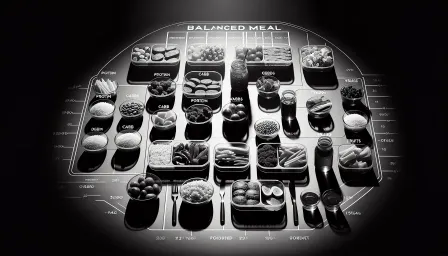Nutrient Timing Definition: Understanding This Key Fitness Concept

Learn about nutrient timing definition, its importance, benefits, and strategies for enhancing your fitness and performance. Understand the science behind nutrient timing.
When it comes to achieving optimal fitness results, one often overlooked factor is nutrient timing. Although you may have heard of the term, understanding its full impact can significantly improve how you approach your nutrition and workouts. This article delves into the definition of nutrient timing, its importance, benefits, and effective strategies for implementation.
Nutrient Timing Definition
Nutrient timing refers to the strategic consumption of nutrients—primarily carbohydrates, proteins, and fats—around your workout schedule to maximize performance, recovery, and muscle repair. This concept is based on the understanding that not all calories and nutrients are created equal, and their effectiveness can vary greatly depending on when they are consumed in relation to physical activity.
The Importance of Nutrient Timing
Understanding and applying nutrient timing can be a game-changer for anyone looking to optimize their fitness, whether you're an elite athlete or simply someone looking to get the most out of your gym sessions. Let's explore some of the key reasons why nutrient timing is essential:
- Enhanced Performance: Consuming the right nutrients at the right times can provide the energy and focus needed for intense workouts.
- Improved Muscle Recovery: Nutrient timing can speed up the muscle repair process, reducing soreness and enabling quicker recovery.
- Increased Muscle Growth: Providing muscles with essential nutrients post-workout supports hypertrophy.
- Better Fat Utilization: Timing your meals can help your body utilize fat more effectively, aiding in fat loss and maintaining lean muscle.
Breaking Down the Science of Nutrient Timing
Pre-Workout Nutrition
Eating before your workout ensures that you have enough energy to perform at your best. Aim to consume a balanced meal with complex carbohydrates, lean protein, and healthy fats 2-3 hours before exercising. Here’s why pre-workout nutrition is crucial:
- Energy Supply: Carbohydrates replenish glycogen stores, providing fuel for your muscles.
- Muscle Protection: Protein can help prevent muscle breakdown during exercise.
- Prolonged Endurance: Healthy fats can provide sustained energy, especially for longer workouts.
Intra-Workout Nutrition
For those engaging in prolonged or high-intensity workouts, consuming key nutrients during the workout can help sustain energy levels and performance. Common intra-workout options include:
- Electrolytes: Help maintain hydration and muscle function.
- Simple Carbohydrates: Provide quick energy without causing digestive issues.
- Branched-Chain Amino Acids (BCAAs): Help reduce muscle fatigue and support protein synthesis.
Post-Workout Nutrition
After a workout, your body enters a recovery phase where replenishing glycogen stores and repairing muscle tissue is crucial. Consuming a mix of protein and carbohydrates within the first 30 to 60 minutes post-exercise can significantly influence recovery and muscle growth. Benefits of post-workout nutrition include:
- Glycogen Replenishment: Carbs help restore glycogen levels, preventing muscle fatigue.
- Muscle Repair and Growth: Protein provides the amino acids necessary for muscle repair and hypertrophy.
- Reduced Muscle Soreness: Proper nutrition can minimize the extent of muscle damage and inflammation.
Effective Nutrient Timing Strategies
Pre-Workout Meal Ideas
Here are some balanced pre-workout meal options to consider:
- Whole Grain Toast with Peanut Butter and Banana: Offers a mix of carbs and protein, plus fast-acting glucose from the banana.
- Oatmeal with Berries and Almonds: Provides sustained energy from complex carbs and healthy fats.
- Greek Yogurt with Honey and Granola: Combines quick-digesting carbs with protein for muscle protection.
Intra-Workout Snacks
Depending on the duration and intensity of your workout, consider these intra-workout options:
- Sports Drinks: Provide electrolytes and quick carbs.
- Fruit Smoothies: Easy to digest and packed with essential nutrients.
- BCAAs Supplement: Mix with water for easy consumption.
Post-Workout Nutrition Tips
Maximize recovery with these post-workout options:
- Protein Shake with Banana: Quick absorption protein paired with carbs to kickstart recovery.
- Chicken Breast with Sweet Potato: Provides essential amino acids and replenishes glycogen stores.
- Quinoa Salad with Grilled Tofu: A plant-based option rich in protein and complex carbs.
Addressing Common Questions about Nutrient Timing
Is Nutrient Timing Necessary for Everyone?
While nutrient timing can benefit anyone, its importance becomes more pronounced for athletes and those engaged in intense or prolonged training sessions. However, even recreational exercisers can see improvements in energy levels, recovery, and overall performance by paying attention to what they eat and when.
Can Nutrient Timing Aid in Weight Loss?
Nutrient timing can be beneficial for weight loss by optimizing metabolic processes and improving exercise performance. However, it should be part of an overall balanced diet and exercise regimen tailored to your specific goals and needs.
What Are the Best Supplements for Nutrient Timing?
While whole foods are the best source of nutrients, certain supplements can be convenient and effective for nutrient timing. Popular options include protein powders, BCAAs, and sports drinks. Always choose high-quality, tested supplements and consult with a healthcare professional before incorporating them into your routine.
Conclusion
Understanding and implementing nutrient timing can play a crucial role in achieving your fitness goals. By strategically consuming the right nutrients before, during, and after your workouts, you can enhance your performance, accelerate recovery, and promote muscle growth. While the science of nutrient timing is complex, adopting even basic strategies can lead to significant results. Start with the recommendations provided in this guide and adjust based on your personal needs and workout intensity.
In essence, nutrient timing is more than just eating at certain times—it's about maximizing your body's potential and making every meal work towards your fitness objectives. Embrace this key concept, and you'll be well on your way to a more efficient and effective fitness journey.



























